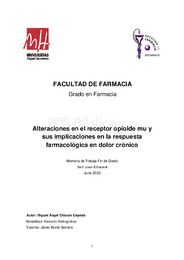Por favor, use este identificador para citar o enlazar este ítem:
https://hdl.handle.net/11000/29901
Alteraciones en el receptor opioide mu y sus implicaciones en la respuesta farmacológica en dolor crónico
Título :
Alteraciones en el receptor opioide mu y sus implicaciones en la respuesta farmacológica en dolor crónico |
Autor :
Chacón Cepeda, Miguel Ángel |
Tutor:
Muriel, Javier  |
Editor :
Universidad Miguel Hernández de Elche |
Departamento:
Departamentos de la UMH::Farmacología, Pediatría y Química Orgánica |
Fecha de publicación:
2023-05-25 |
URI :
https://hdl.handle.net/11000/29901 |
Resumen :
El dolor crónico es tratado frecuentemente con analgésicos opioides, los cuales no están exentos de limitaciones en cuanto a su efectividad y seguridad. Las alteraciones genéticas a nivel del receptor opioide mu podrían condicionar una diferente respuesta farmacológica entre diferentes individuos. Los objetivos de este estudio son comprobar si la evidencia científica demuestra la implicación de las alteraciones en el gen OPRM1 sobre el tratamiento farmacológico del dolor crónico, así como otros objetivos secundarios como identificar las posibles asociaciones otros polimorfismos genéticos y como estos afectan a efectividad y seguridad. Para ello, se diseña un estudio descriptivo transversal que incluye el análisis crítico de los trabajos recuperados mediante una revisión sistemática de los artículos disponibles en la principal base de datos de ciencias de la salud (MEDLINE) vía PubMed. Se obtuvieron resultados para la intensidad del dolor crónico y del posible impacto que pudiese tener el gen OPRM1 sobre este, así como también vimos la influencia que ejerce este gen sobre la efectividad farmacológica y sobre la seguridad y los efectos adversos que se mostraron para los pacientes estudiados; por último, se obtuvieron resultados de diversos genes implicados en las vías del dolor, destacando COMT.
Se concluye que no hay evidencia suficiente de influencia del gen OPRM1 rs1799971 en dolor crónico, además se necesitan más estudios en cuanto efectividad y seguridad. Así como se estudió la influencia de otros genes; sin hallar resultados concluyentes.
Chronic pain is frequently treated with opioid analgesics, which are not without limitations in terms of their effectiveness and safety. Genetic alterations at the mu opioid receptor level may lead to a different pharmacological response between individuals. We will briefly explain chronic pain and the current limitations in its approach and management, as well as explaining the types of opioid receptors and opioids; to finally enter the field of pharmacogenetics. The objectives of this study are to check whether the scientific evidence demonstrates the implication of alterations in the OPRM1 gene on the pharmacological treatment of chronic pain, as well as other secondary objectives such as identifying possible associations between genetic polymorphisms and how these affect effectiveness and safety. To this end, it was designed a cross-sectional descriptive study that included a critical analysis of the papers retrieved through a systematic review of the articles available in the main health sciences database (MEDLINE) via PubMed. The obtained results for the intensity of chronic pain and the possible impact that the OPRM1 gene could have on this, as well as the influence that this gene exerts on pharmacological effectiveness and on the safety and adverse effects that were shown for the patients studied; finally, results were obtained for various genes involved in the pain pathways, with COMT being the most important. After examining the results, it was concluded that there is insufficient evidence of the influence of the OPRM1 rs1799971 gene on chronic pain, and that further studies are needed on effectiveness and safety. We also studied the influence of other genes, without finding conclusive results.
|
Palabras clave/Materias:
OPRM1
analgésicos opioides
farmacogenética
respuesta farmacológica |
Área de conocimiento :
CDU: Ciencias aplicadas: Medicina: Farmacología. Terapéutica. Toxicología. Radiología |
Tipo de documento :
info:eu-repo/semantics/bachelorThesis |
Derechos de acceso:
info:eu-repo/semantics/openAccess |
Aparece en las colecciones:
TFG - Farmacia
|
 La licencia se describe como: Atribución-NonComercial-NoDerivada 4.0 Internacional.
La licencia se describe como: Atribución-NonComercial-NoDerivada 4.0 Internacional.
 La licencia se describe como: Atribución-NonComercial-NoDerivada 4.0 Internacional.
La licencia se describe como: Atribución-NonComercial-NoDerivada 4.0 Internacional.
.png)
